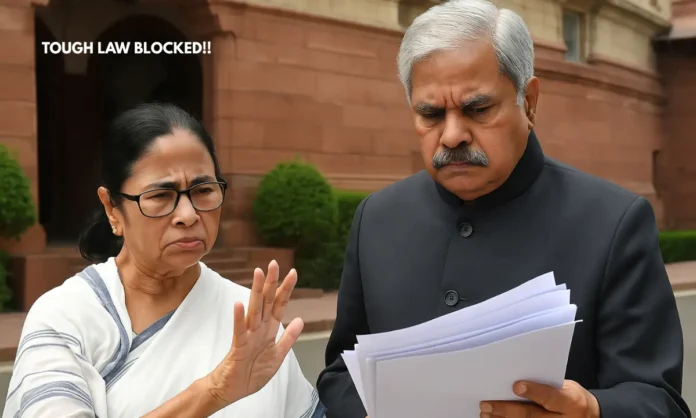Summary
- Governor CV Ananda Bose returns the Aparajita Bill, calling penalties “disproportionate.”
- Provisions like mandatory death penalty for certain rape cases face legal objections.
- The Mamata Banerjee government vows protests and defends the bill as critical for women’s safety.
A Standoff Over Justice: The Fate of the Aparajita Bill
The Aparajita Women and Child (West Bengal Criminal Laws Amendment) Bill, 2024, designed to impose stricter punishments for sexual assault, has hit a major roadblock after Governor CV Ananda Bose sent it back to the Mamata Banerjee government. The bill, passed amid public outrage over the RG Kar Hospital rape and murder case, aimed to increase the minimum sentence for rape from 10 years to life imprisonment or even the death penalty in extreme cases.
Governor Bose, however, highlighted constitutional and legal concerns, pointing out that the proposed punishments were “excessively harsh and disproportionate.” He specifically objected to the removal of distinctions between crimes against minors of different age groups and the mandatory death penalty clause for victims who die or are left in a vegetative state — a move that contradicts the Supreme Court’s landmark Mithu vs Punjab (1983) judgment, which deemed mandatory death penalties unconstitutional.
BJP-nominated @BengalGovernor returns West Bengal's #AparajitaBill, citing the Centre's "objections." So Feku's govt has a problem with a strong anti-rape law demanding capital punishment for rapists? What are they protecting? pic.twitter.com/X6mrUR3Ud0
— @PoliJester (@PoliJester420) July 25, 2025
Legal Objections vs. Public Sentiment
- Objections cite the principle of proportionality in sentencing.
- Mandatory death penalty considered against judicial discretion.
- Classification for rape of minors (under 12 vs. under 16) deemed necessary.
The governor’s decision comes at a time when public anger over women’s safety remains high, particularly following the RG Kar case and the recent Kasba Law College rape incident. Legal experts have echoed concerns about mandatory sentencing, noting that such provisions could fail judicial scrutiny and undermine the flexibility needed for fair trial outcomes.
Trinamool Congress (TMC) leaders, however, see the move as politically motivated. “Why did the Centre return the Aparajita Bill? Is protecting women’s safety a ‘cruel’ measure now?” questioned TMC state general secretary Kunal Ghosh. He warned of large-scale protests against what the party perceives as the Centre’s obstruction of progressive reforms aimed at protecting women.
The Political Battle Lines Ahead
- TMC vows to defend the bill as Mamata Banerjee’s toughest stance on women’s safety.
- BJP accused of undercutting state efforts to address crimes against women.
- Public advocacy groups demand both stringent laws and judicial fairness.
With the governor returning the bill, the state government must now either revise it to address the legal concerns or send it back to the governor unchanged, potentially escalating the standoff between the Centre and the state. Women’s rights activists believe that while harsher punishments alone won’t curb sexual crimes, strong enforcement mechanisms combined with speedy trials are necessary.
Final Verdict: A Clash Between Legal Scrutiny and Public Outrage
The return of the Aparajita Anti-Rape Bill exposes the friction between the demand for stronger deterrents against sexual crimes and the constitutional requirement for proportional justice. While the governor’s concerns over mandatory death penalties and disproportionate sentences align with Supreme Court precedents, the Mamata Banerjee government sees this as an attempt to dilute its toughest stance yet on women’s safety.
This standoff is more than a legal debate — it underscores India’s struggle to balance punitive laws with judicial fairness while responding to a deeply outraged public. The next steps, whether the bill is revised or re-sent, will test both the state government’s resolve and the Centre’s willingness to engage in cooperative federalism on issues as sensitive as gender justice.


